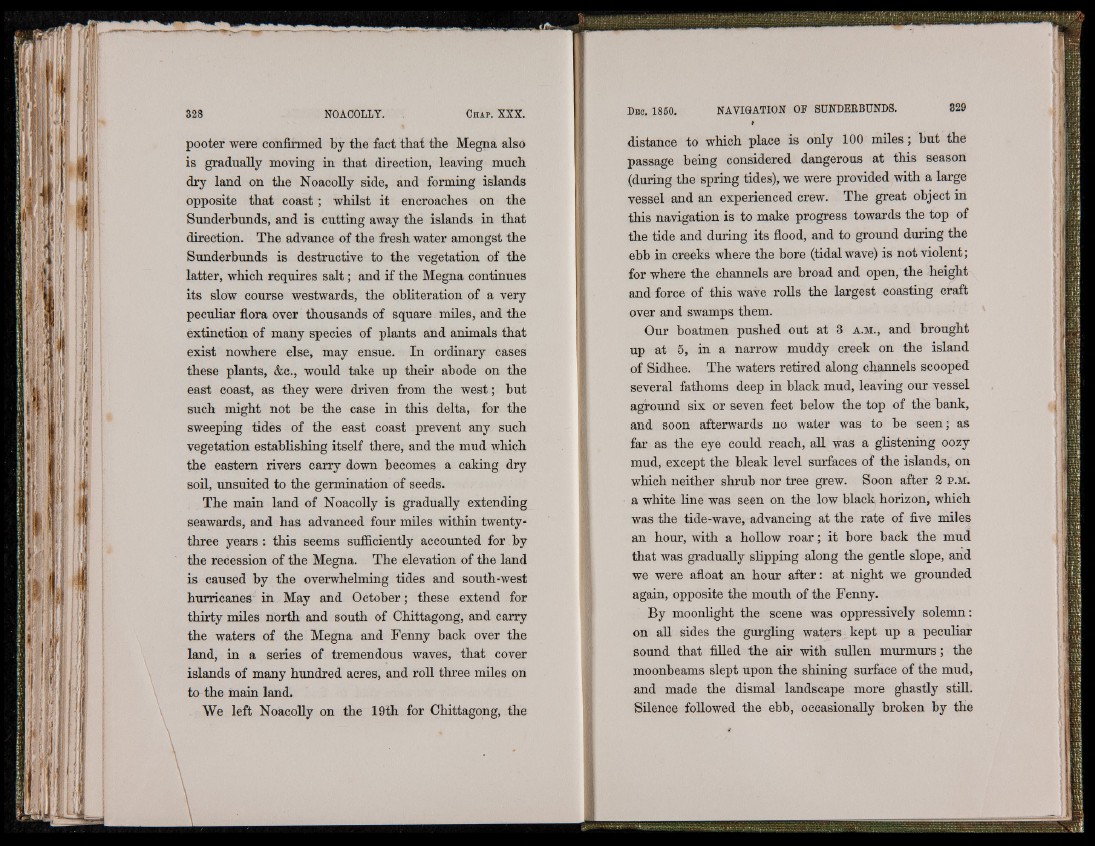
pooter were confirmed by the fact that the Megna also
is gradually moving in that direction, leaving much
dry land on the Noacolly side, and forming islands
opposite that c o a st; whilst it encroaches on the
Sunderbunds, and is cutting away the islands in that
direction. The advance of the fresh water amongst the
Sunderbunds is destructive to the vegetation of the
latter, which requires s a lt; and if the Megna continues
its slow course westwards, the obliteration of a very
peculiar flora over thousands of square miles, and the
extinction of many species of plants and animals that
exist nowhere else, may ensue. In ordinary cases
these plants, &c., would take up their abode on the
east coast, as they were driven from the west; but
such might not be the case in this delta, for the
sweeping tides of the east coast prevent any such
vegetation establishing itself there, and the mud which
the eastern rivers carry down becomes a caking dry
soil, unsuited to the germination of seeds.
The main land of Noacolly is gradually extending
seawards, and has advanced four miles within twenty-
three years : this seems sufficiently accounted for by
the recession of the Megna. The elevation of the land
is caused by the overwhelming tides and south-west
hurricanes in May and October; these extend for
thirty miles north and south of Chittagong, and carry
the waters of the Megna and Fenny back over the
land, in a series of tremendous waves, that cover
islands of many hundred acres, and roll three miles on
to the main land.
We left Noacolly on the 19th for Chittagong, the
distance to which place is only 100 miles; but the
passage being considered dangerous at this season
(during the spring tides), we were provided with a large
vessel and an experienced crew. The great object in
this navigation is to make progress towards the top of
the tide and during its flood, and to ground during the
ebb in creeks where the bore (tidal wave) is not violent;
for where the channels are broad and open, the height
and force of this wave rolls the largest coasting craft
over and swamps them.
Our boatmen pushed out at 3 a .m ., and brought
up at 5, in a narrow muddy Creek on the island
of Sidhee. The waters retired along channels scooped
several fathoms deep in black mud, leaving our vessel
aground six or seven feet below the top of the bank,
and soon afterwards no water was to be seen; as
far as the eye could reach, all was a glistening oozy
mud, except the bleak level surfaces of the islands, on
which neither shrub nor tree grew. Soon after 2 p .m .
a white line was seen on the low black horizon, which
was the tide-wave, advancing at the rate of five miles
an hour, with a hollow ro a r; it bore back the mud
that was gradually slipping along the gentle slope, and
we were afloat an hour after: at night we grounded
again, opposite the mouth of the Fenny.
By moonlight the scene was oppressively solemn:
on all sides the gurgling waters kept up a peculiar
sound that filled the air with sullen murmurs; the
moonbeams slept upon the shining surface of the mud,
and made the dismal landscape more ghastly still.
Silence followed the ebb, occasionally broken by the